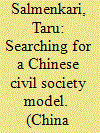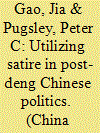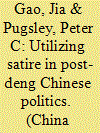| Srl | Item |
| 1 |
ID:
085009


|
|
|
|
|
| Publication |
2008.
|
| Summary/Abstract |
Excluding others from membership tends to reveal the instability of anyone's terms of belonging in society. Hong Kong's Anticult Initiative of 2001 sought to establish the legal difference between cult and religion and to exclude some from the protections offered by freedom of religion. In the context of Hong Kong's own renegotiation of political authority with China this initiative prompted Protestant and Catholic leaders to reflect on the peculiarities of their own faith and reassess their position in a post-1997 polity. This article analyzes public discourse, both newspaper editorials and interviews, to document a turn in self-perception away from privilege and toward vulnerability. Now that Christians can imagine themselves, like the assumed target of the anticult initiative, Falun Gong, vulnerable to restrictions on their freedom of religion, they indicate an acceptance of their unstable position and an emerging willingness to take on new concerns and allies. In the face of exclusivity, liberal Christians manage a shift toward greater inclusiveness whose extent is yet uncharted.
|
|
|
|
|
|
|
|
|
|
|
|
|
|
|
|
| 2 |
ID:
085321


|
|
|
|
|
| Publication |
2008.
|
| Summary/Abstract |
Excluding others from membership tends to reveal the instability of anyone's terms of belonging in society. Hong Kong's Anticult Initiative of 2001 sought to establish the legal difference between cult and religion and to exclude some from the protections offered by freedom of religion. In the context of Hong Kong's own renegotiation of political authority with China this initiative prompted Protestant and Catholic leaders to reflect on the peculiarities of their own faith and reassess their position in a post-1997 polity. This article analyzes public discourse, both newspaper editorials and interviews, to document a turn in self-perception away from privilege and toward vulnerability. Now that Christians can imagine themselves, like the assumed target of the anticult initiative, Falun Gong, vulnerable to restrictions on their freedom of religion, they indicate an acceptance of their unstable position and an emerging willingness to take on new concerns and allies. In the face of exclusivity, liberal Christians manage a shift toward greater inclusiveness whose extent is yet uncharted.
|
|
|
|
|
|
|
|
|
|
|
|
|
|
|
|
| 3 |
ID:
085318


|
|
|
| 4 |
ID:
085319


|
|
|
|
|
| Publication |
2008.
|
| Summary/Abstract |
This study hypothesizes that the Chinese state uses NGOs as objects of consultation for improving its policymaking in the same way it consults mass organizations, democratic parties, and official professional associations to obtain specialist information. This model of consultation is based on the mass-line model and on its application within democratic centralist administrative hierarchies. The investigation shows that, apart from their main social or environmental tasks, Chinese NGOs indeed inform the state, many of them with policy formulation in mind. It also shows that the Chinese state uses democratic centralist vocabulary to describe the tasks that it assumes NGOs should undertake. However, apart from the mass-line type of consultation, both NGOs and the state have other conceptions about the proper roles for NGOs. The state now promotes the idea of civil society as an independent service provider, while NGOs seek an even larger sphere of social autonomy and self-organization.
|
|
|
|
|
|
|
|
|
|
|
|
|
|
|
|
| 5 |
ID:
085011


|
|
|
|
|
| Publication |
2008.
|
| Summary/Abstract |
Although China's institutional campaign against the Falun Gong has been closely observed and analyzed, researchers have failed to take note of the subversive power of satire utilized in the comic theatrical skits (xiaopin) of popular comedian Zhao Benshan to ridicule the Falun Gong. This exemplifies the Chinese Communist Party's long-established political practice of "educating the masses." Based on an analysis of what are now commonly referred to as "Zhao Benshan xiaopin" and their perceived impact on the Falun Gong issue, this article examines how satirical power in post-Deng Chinese politics has been employed, and it outlines the key features of the practice. This article reviews the use of satire as a political weapon in contemporary Chinese politics, before turning to focus on four relevant Zhao Benshan xiaopin and the way in which they create popular metaphors for propagating official views in the anti-Falun Gong campaign
|
|
|
|
|
|
|
|
|
|
|
|
|
|
|
|
| 6 |
ID:
085322


|
|
|
|
|
| Publication |
2008.
|
| Summary/Abstract |
Although China's institutional campaign against the Falun Gong has been closely observed and analyzed, researchers have failed to take note of the subversive power of satire utilized in the comic theatrical skits (xiaopin) of popular comedian Zhao Benshan to ridicule the Falun Gong. This exemplifies the Chinese Communist Party's long-established political practice of "educating the masses." Based on an analysis of what are now commonly referred to as "Zhao Benshan xiaopin" and their perceived impact on the Falun Gong issue, this article examines how satirical power in post-Deng Chinese politics has been employed, and it outlines the key features of the practice. This article reviews the use of satire as a political weapon in contemporary Chinese politics, before turning to focus on four relevant Zhao Benshan xiaopin and the way in which they create popular metaphors for propagating official views in the anti-Falun Gong campaign
|
|
|
|
|
|
|
|
|
|
|
|
|
|
|
|